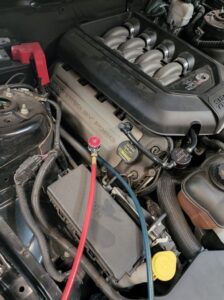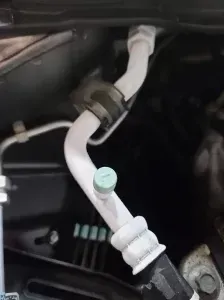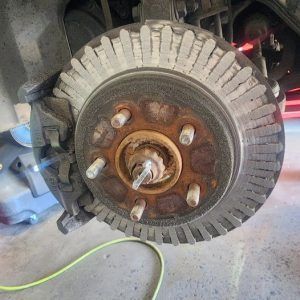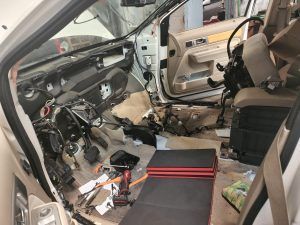A Faulty Car AC Evaporator Core: What To Look For
If you’ve noticed warm air coming from your car’s vents, a strange odor in the cabin, or reduced airflow, it might be a sign of a faulty AC evaporator core. This crucial component of your car’s air conditioning system is responsible for cooling the air before it reaches the cabin. When it malfunctions, you’ll experience a range of symptoms that should not be ignored.
Leaking fluids is another common indication of a faulty AC evaporator core. If you find pools of liquid underneath your vehicle, it’s time to investigate further.
Additionally, unusual noises, such as hissing or clicking sounds, can be a sign of a problem with the evaporator core.
Identifying these symptoms early on is essential to prevent further damage and costly repairs. In this article, we will explore in detail the common symptoms of a faulty car AC evaporator core, so you know exactly what to look for. Don’t let a malfunctioning AC system ruin your driving experience – stay informed and take action when necessary.
Key Takeaways
– Warm air from vents is a common symptom of a faulty evaporator core.
– Strange odors in the cabin can indicate mold, mildew, or a refrigerant leak in the evaporator core.
– Leaking fluids underneath the car can be a sign of a faulty evaporator core.
– Unusual noises like hissing or clicking suggest a problem with the evaporator core.
Warm Air Coming from Vents
Are you feeling hot and bothered with warm air blowing out of your car vents? Don’t sweat it! This could be a sign of a faulty car AC evaporator core. The AC system in your car relies on a properly functioning evaporator core to cool the air before it blows into the cabin. If the core is faulty, it may not be able to absorb the heat from the air effectively, resulting in warm air blowing out of the vents.
To troubleshoot AC problems, it’s important to perform regular AC system maintenance. This includes checking the refrigerant levels, cleaning or replacing the air filters, and inspecting the condenser for any damage or obstructions. However, if you’ve already done these maintenance tasks and you’re still experiencing warm air, it’s likely that the evaporator core is to blame.
To fix this issue, you will need to replace the faulty evaporator core. This is a complex task that requires specialized knowledge and skills, so it’s best to leave it to a professional mechanic. Once the evaporator core is replaced, you should notice a significant improvement in the cooling performance of your car’s AC system.
Now, let’s move on to the next section, where we’ll discuss another common symptom of a faulty evaporator core: a strange odor in the cabin.
Strange Odor in the Cabin
As you step into your car, a strange and unpleasant odor wafts from the cabin, tainting the air and making you pinch your nose in disgust. This foul smell is often an indication of a faulty car AC evaporator core.
Several factors can contribute to this issue. One possible cause is the presence of mold or mildew in the AC system. Moisture can accumulate in the evaporator core, creating a breeding ground for these microorganisms. Another potential cause is a clogged or dirty cabin air filter. When the filter becomes congested with debris and pollutants, it can emit an unpleasant smell. Additionally, a refrigerant leak may lead to a pungent odor. The refrigerant contains chemicals that produce a distinct smell when exposed to air.
To eliminate odors from car AC systems, it is important to address the root cause. Cleaning the AC system, including the evaporator core and cabin air filter, can help remove mold, mildew, and debris. If a refrigerant leak is suspected, it’s crucial to have it repaired by a professional.
By addressing these issues, you can restore a pleasant and fresh aroma to your car’s cabin.
Now, let’s delve into the next section and discuss the potential problem of leaking fluids.
Leaking Fluids
When you step out of your car, the sight of mysterious puddles underneath it raises concerns about leaking fluids. This is one of the common symptoms of a faulty car AC evaporator core.
The evaporator core is an important component of your car’s AC system, responsible for cooling the air that enters your vehicle’s cabin. If you notice any fluid leaking from your car, it could be a sign that the evaporator core is damaged or has a leak. The fluid you see may be refrigerant, which is a vital component of the AC system. Leaking refrigerant not only affects the cooling performance of your AC system but can also be harmful to the environment.
If you suspect a leaking evaporator core, it’s essential to have it checked and repaired by a professional car AC repair technician. Regular AC system maintenance can help prevent such issues and ensure optimal performance.
With leaking fluids being addressed, let’s move on to the next symptom: reduced airflow.
Reduced Airflow
To improve the airflow in your vehicle, you can try cleaning or replacing the air filters regularly. Restricted airflow is a common symptom of a faulty car AC evaporator core. If you notice weak ventilation or reduced airflow from the vents, it may be a sign that your evaporator core isn’t functioning properly.
Here are three reasons why restricted airflow can be frustrating and inconvenient:
1. Uncomfortable rides: Insufficient airflow can make your car feel stuffy and uncomfortable, especially during hot summer days. It can lead to a sweaty and unpleasant driving experience, making your daily commute a hassle.
2. Poor air quality: Restricted airflow can also affect the quality of the air inside your vehicle. Without proper ventilation, dust, pollen, and other allergens can accumulate, causing allergies and respiratory issues. It can make your car an unhealthy environment for you and your passengers.
3. Inefficient cooling: Weak ventilation can hinder the cooling performance of your car’s AC system. It may take longer for the cabin to reach a comfortable temperature, and even then, it may not cool as effectively as it should. This can be particularly frustrating on long drives or during scorching summers.
Addressing restricted airflow is crucial to maintain a comfortable and healthy driving environment. If you’re experiencing this issue, it’s time to check for other common symptoms, such as unusual noises, which could indicate a faulty AC evaporator core.
Unusual Noises
If you hear hissing or whistling sounds coming from your car’s AC system, it could be a sign of a faulty evaporator core. This could indicate a refrigerant leak, causing a decrease in cooling efficiency.
On the other hand, rattling or clanking noises might suggest a loose or damaged component within the evaporator core, such as a fan or motor.
It’s important to address these unusual noises promptly to prevent further damage to your AC system.
Hissing or Whistling Sounds
Listen closely for any hissing or whistling sounds coming from your car’s AC system – they may be a telltale sign of a faulty evaporator core. As the evaporator core is responsible for cooling the air that enters your car’s cabin, any leaks or damage can disrupt its functionality and lead to these distinct sounds.
To further diagnose the issue, pay attention to the following:
– Check for any signs of refrigerant leaks, such as oily residue or a sweet smell.
– Observe if the hissing or whistling sounds are more noticeable when the AC is turned on.
– Note if the sounds become louder or more intense when the AC is set to higher fan speeds.
Regular AC system maintenance and inspections are crucial to identifying problems like a faulty evaporator core early on. If you suspect any issues, it’s advisable to consult a professional for a thorough diagnosis and repair.
Now, let’s move on to the next section about rattling or clanking noises.
Rattling or Clanking Noises
When you turn on your car’s AC, you may hear a mysterious rattling or clanking noise that echoes through the cabin, making you wonder what hidden component could be causing such a disturbance. One possible culprit could be a faulty AC evaporator core. The AC evaporator core is a vital component responsible for cooling the air that enters your car’s cabin. Over time, it can develop issues that result in rattling or clanking noises. It is important to address these noises promptly to prevent further damage to the AC system. To troubleshoot AC noises, you can refer to the following table for common causes and solutions:
| Noise Description | Possible Cause | Solution |
|——————-|—————-|———-|
| Rattling | Loose components in the AC system | Tighten or replace loose components |
| Clanking | Damaged or broken AC evaporator core | Replace the faulty AC evaporator core |
Regular AC evaporator core maintenance, such as cleaning and inspecting for damage, can help prevent these noises and ensure optimal performance of your car’s AC system.
Frequently Asked Questions
How much does it cost to replace a faulty car AC evaporator core?
The cost to replace a faulty car AC evaporator core can vary depending on several factors such as the make and model of the car, labor costs, and whether you choose to do the repairs yourself.
Can a faulty car AC evaporator core cause damage to other parts of the car’s cooling system?
Yes, a faulty car AC evaporator core can cause damage to other parts of the car’s cooling system. It is not repairable and needs to be replaced. The replacement process typically takes several hours.
Are there any temporary solutions to fix a faulty car AC evaporator core before getting it replaced?
For a temporary fix to a faulty car AC evaporator core, you can try sealing any leaks with AC stop leak products. However, it is recommended to replace the core as soon as possible to avoid further damage to the car’s cooling system.
Can a faulty car AC evaporator core affect the overall performance of the car’s air conditioning system?
A faulty car AC evaporator core can significantly impact the overall performance of the air conditioning system. Signs of a faulty evaporator core include reduced cooling ability, weak airflow, and strange odors.
Are there any DIY methods to detect a faulty car AC evaporator core before taking it to a professional mechanic?
To detect a faulty car AC evaporator core, you can look for signs like weak airflow, strange odors, or water pooling on the floor. DIY methods include checking for leaks, inspecting the core for damage, and using a pressure gauge.
Conclusion
So there you have it, now you know what to look for when it comes to a faulty car AC evaporator core. If you experience warm air coming from your vents, a strange odor in the cabin, leaking fluids, reduced airflow, or unusual noises, it’s likely that your evaporator core is to blame.
Don’t ignore these symptoms as they can lead to further damage and costly repairs. Make sure to have your car checked by a professional to ensure a properly functioning AC system.







